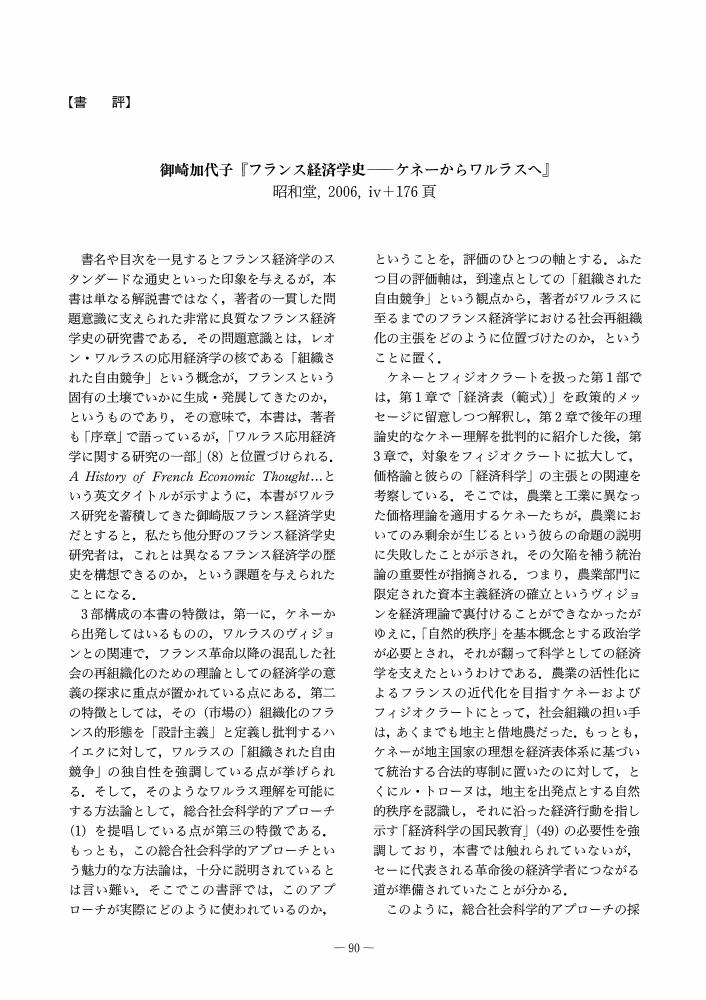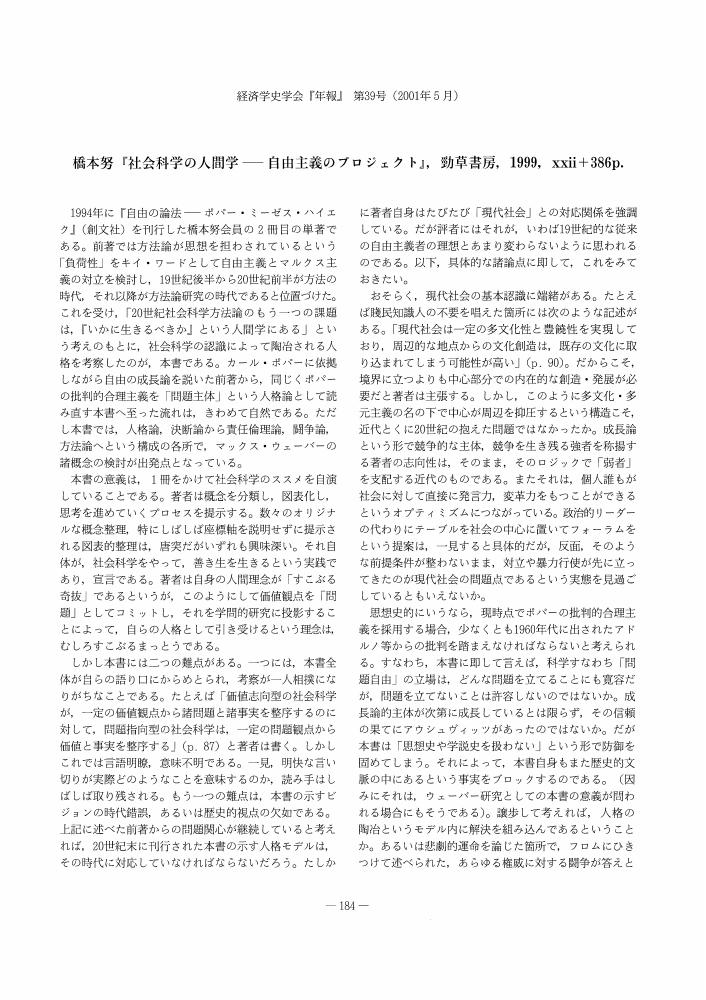- 著者
- 小林 純
- 出版者
- 経済学史学会
- 雑誌
- 経済学史研究 (ISSN:18803164)
- 巻号頁・発行日
- vol.49, no.2, pp.92-93, 2007-12-25 (Released:2010-08-05)
- 著者
- 小林 純
- 出版者
- 経済学史学会
- 雑誌
- 経済学史研究 (ISSN:18803164)
- 巻号頁・発行日
- vol.51, no.2, pp.122-123, 2009 (Released:2019-08-08)
- 著者
- 柳沢 のどか
- 出版者
- 経済学史学会
- 雑誌
- 経済学史研究 (ISSN:18803164)
- 巻号頁・発行日
- vol.50, no.2, pp.107-108, 2009-02-05 (Released:2010-08-05)
2 0 0 0 OA ドイツ自由主義経済学における市場と福祉 W. レプケの社会経済思想をめぐって
- 著者
- 藤本 建夫
- 出版者
- 経済学史学会
- 雑誌
- 経済学史研究 (ISSN:18803164)
- 巻号頁・発行日
- vol.52, no.2, pp.63-82, 2011 (Released:2019-08-20)
The “welfare” of a nation and the “welfare state” should be considered separately. Various economic and social ideas were born during the interwar period and the war. One of these was the welfare state theory against the Nazis state. W. Beveridge, a Keynesian economist, discussed the “welfare state” from the premises of an effective, state-controlled economy. In Germany, the liberalist group of the anti-Nazis prepared for the theoretical core of social economics( social market economy) for the after-war period, which was not only opposed to the Keynesian state and economy but also criticized the Hayekian fundamentalism of the market economy. One of the leading theoreticians, W. Röpke, found preconditions for the more human and affluent economic society in the competing market economy and the decentralization( subsidiarity). In rising productivity, the diligent and saving workers and the “conform state interventions” are capable of creating a humane economic society. Röpke’s way of thinking harmonized with Catholic doctrines. On Reconstruction of the Social Order( Pius XI, 1931) was an extremely important document for him. Politically, it justifies the decentralization by stating that the greater association should be assigned to subordinate organizations. In terms of the worker-employer relationship, the worker shares ownership or management in that the worker contract can be modified by a partnership contract. Here, the welfare of workers will rise, though the state does not take care of individual workers like Beveridge Plan. This is also the Röpke’s goal of “welfare.” JEL classification numbers: B 25, I 31, P 46.
2 0 0 0 OA 田村信一・原田哲史編著『ドイツ経済思想史』八千代出版, 2009年, v+264頁
- 著者
- 柳澤 治
- 出版者
- 経済学史学会
- 雑誌
- 経済学史研究 (ISSN:18803164)
- 巻号頁・発行日
- vol.52, no.1, pp.112-113, 2010 (Released:2019-10-25)
2 0 0 0 OA 1930 年代スウェーデン人口問題におけるミュルダール 「消費の社会化」論の展開
- 著者
- 藤田 菜々子
- 出版者
- 経済学史学会
- 雑誌
- 経済学史研究 (ISSN:18803164)
- 巻号頁・発行日
- vol.51, no.1, pp.76-92, 2009 (Released:2019-06-22)
- 参考文献数
- 49
- 著者
- 大島 幸治 佐藤 有史
- 出版者
- 経済学史学会
- 雑誌
- 経済学史研究 (ISSN:18803164)
- 巻号頁・発行日
- vol.52, no.1, pp.67-83, 2010 (Released:2019-08-20)
- 著者
- 有江 大介
- 出版者
- 経済学史学会
- 雑誌
- 経済学史研究 (ISSN:18803164)
- 巻号頁・発行日
- vol.50, no.1, pp.113-114, 2008-07-31 (Released:2010-08-05)
2 0 0 0 OA 御崎加代子『フランス経済学史―ケネーからワルラスヘ』昭和堂, 2006, iv+176頁
- 著者
- 栗田 啓子
- 出版者
- 経済学史学会
- 雑誌
- 経済学史研究 (ISSN:18803164)
- 巻号頁・発行日
- vol.49, no.2, pp.90-91, 2007-12-25 (Released:2010-08-05)
2 0 0 0 OA 森嶋通夫『森嶋通夫著作集』全14巻+別巻岩波書店, 2004-2006
- 著者
- 浅田 統一郎
- 出版者
- 経済学史学会
- 雑誌
- 経済学史研究 (ISSN:18803164)
- 巻号頁・発行日
- vol.49, no.1, pp.172-173, 2007-06-30 (Released:2010-08-05)
- 著者
- 村上 俊介
- 出版者
- 経済学史学会
- 雑誌
- 経済学史学会年報 (ISSN:04534786)
- 巻号頁・発行日
- vol.34, no.34, pp.169-170, 1996 (Released:2010-08-05)
- 著者
- 太田 仁樹
- 出版者
- 経済学史学会
- 雑誌
- 経済学史学会年報 (ISSN:04534786)
- 巻号頁・発行日
- vol.41, no.41, pp.102-103, 2002 (Released:2010-08-05)
- 著者
- 住谷 一彦
- 出版者
- 経済学史学会
- 雑誌
- 経済学史学会年報 (ISSN:04534786)
- 巻号頁・発行日
- vol.46, no.46, pp.108-110, 2004 (Released:2010-08-05)
- 著者
- 中山 智香子
- 出版者
- 経済学史学会
- 雑誌
- 経済学史研究 (ISSN:18803164)
- 巻号頁・発行日
- vol.48, no.1, pp.149-151, 2006-06-30 (Released:2010-08-05)
- 著者
- 杉原 四郎
- 出版者
- 経済学史学会
- 雑誌
- 経済学史学会年報 (ISSN:04534786)
- 巻号頁・発行日
- vol.43, no.43, pp.114-115, 2003 (Released:2010-08-05)
- 著者
- 中山 智香子
- 出版者
- 経済学史学会
- 雑誌
- 経済学史学会年報 (ISSN:04534786)
- 巻号頁・発行日
- vol.39, no.39, pp.184-185, 2001 (Released:2010-08-05)
2 0 0 0 OA 江頭進『F. A. ハイエクの研究』, 日本経済評論社, 1999, ix+344p.
- 出版者
- 経済学史学会
- 雑誌
- 経済学史学会年報 (ISSN:04534786)
- 巻号頁・発行日
- vol.38, no.38, pp.186-188, 2000 (Released:2010-08-05)
- 著者
- 千賀 重義
- 出版者
- 経済学史学会
- 雑誌
- 経済学史学会年報 (ISSN:04534786)
- 巻号頁・発行日
- vol.38, no.38, pp.172-173, 2000 (Released:2010-08-05)
2 0 0 0 OA 吉田憲夫『資本論の思想-マルクスと廣松物象化論-』, 情況出版, 1995, 366p.
- 著者
- 石塚 良次
- 出版者
- 経済学史学会
- 雑誌
- 経済学史学会年報 (ISSN:04534786)
- 巻号頁・発行日
- vol.34, no.34, pp.171, 1996 (Released:2010-08-05)
- 著者
- 大森 郁夫
- 出版者
- 経済学史学会
- 雑誌
- 経済学史学会年報 (ISSN:04534786)
- 巻号頁・発行日
- vol.34, no.34, pp.162, 1996 (Released:2010-08-05)


















